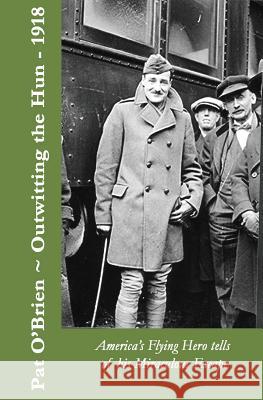Outwitting the Hun » książka
Outwitting the Hun
ISBN-13: 9780989796507 / Angielski / Miękka / 2013 / 188 str.
Pat O'Brien wrote this book in London during the fall of 1917 while recovering from a two month trek across Western Europe. On August 17, 1917, he was shot in the throat during a battle with German planes at 8,000 feet. He survived the crash of his Sopwith Pup aeroplane and was operated on by a German Army physician in the enemy's field hospital, saving his life. One month later, while being transferred with other prisoners to the German interior, he jumped from the moving prison train and began his journey behind enemy lines through Germany, Luxemburg and Belgium. At the Holland border he dug under a nine-foot electrical fence to freedom. One week later he was guest of the King of England for nearly one hour at Buckingham Palace. O'Brien was an American from Momence, Illinois who joined the British Royal Flying Corp before the United States had its own air force. He had joined the U.S. Army Signal Corp where testing had begun on military aircraft. Pat was among the first pilots to test aircraft at North Island in San Diego. He became impatient waiting for the Army to form an official aviation force and for President Wilson to join the war. He resigned the Signal Corp and joined the British effort in Canada, eventually earning his wings in England. Following his escape, O'Brien was given a six-month medical leave and returned home to Momence on January 22, 1918. One week later he began a speaking tour of the United States to raise war bonds. He spoke in every major city in the country and replaced William Jennings Bryant as the top speaker in the country that year. His top-selling book "Outwitting the Hun," led to a lead role in a silent film, hundreds of newspaper and magazine stories and a significant fortune. O'Brien was a celebrity but he was also a patriot. He had lost many friends in the war including his closest "chum" Paul Raney of Toronto who Pat witnessed being shot from the sky. Raney's dogfight occurred as Pat sat in a wheelchair sunning outside the field hospital following surgery. Despite his fame and fortune, O'Brien was compelled to return to the battle. He attempted to join the American force, re-enter the Royal Flying Corp and even join the French Foreign Legion. He was denied entry due to his health and the impending end of the war. His desire to "fight one more time" led to an adventure in Russia during the Russian Revolution where thousands of Allied troops were attempting to escape the battle between Tsarist loyalists and the Red Army. As a former railroad man and an experienced escaped prisoner his desire was to aid in the removal of Allied troops along the Trans-Siberian Railroad. His return home included passage through Mongolia and China. In 1920, his personal life and fame began to wane. Following the break-up of his relationship with Agnes McMillan who he had betrothed in San Francisco before the war, he found himself among the rich and famous including members of the New York mob and the burgeoning entertainment mecca of Havana, Cuba. While filming his moving "Shadows of the West," he married Virginia Dale who also appeared in his film. Pat O'Brien was found dead in the Hamilton Hotel on December 18, 1920 with a bullet to his head. His death was declared a suicide and he was buried in Momence without a grave marker. Locals provided a marker from Pat seventy-seven years later in 2007. The burial ceremony in 2007 led to the writing of the book, "Lt. Pat O'Brien," by Kevin McNulty, Sr., KMC PUBLISING, (c) 2013. The eight-hundred page novel covers Pat's entire life and also reveals new evidence indicating he was murdered. That mystery continues today. While there has been much erroneous information about Pat O'Brien printed and online, the book "Lt. Pat O'Brien," is the most definitive and accurate account of O'Brien's life and family. McNulty and O'Brien both from Momence, Illinois.











